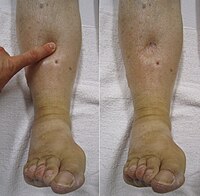
Photo from wikipedia
Despite the introduction of more restrictive fluid in the management of diabetic ketoacidosis (DKA) such as that advocated by Lillie et al ,1 there is little epidemiological evidence to suggest… Click to show full abstract
Despite the introduction of more restrictive fluid in the management of diabetic ketoacidosis (DKA) such as that advocated by Lillie et al ,1 there is little epidemiological evidence to suggest that more restrictive regimens have reduced the incidence of cerebral oedema. Cerebral oedema occurs prior to the administration of fluid in up to 19% of cases, and subclinical oedema has been demonstrated on MRI in up to 50% of cases.2 3 Why some patients evolve cerebral oedema and others do not and the role of fluids remain unclear and contentious. Experts suggest that it results from initial hypoperfusion followed by vasogenic/reperfusion injury rather than the traditional view of osmotic changes. In 2019, a multidisciplinary expert working group (including paediatric intensivists) was convened by the British Society of Paediatric Endocrinology and Diabetes to review the previous guideline published in 2015 …
Journal Title: Archives of Disease in Childhood
Year Published: 2020
Link to full text (if available)
Share on Social Media: Sign Up to like & get
recommendations!